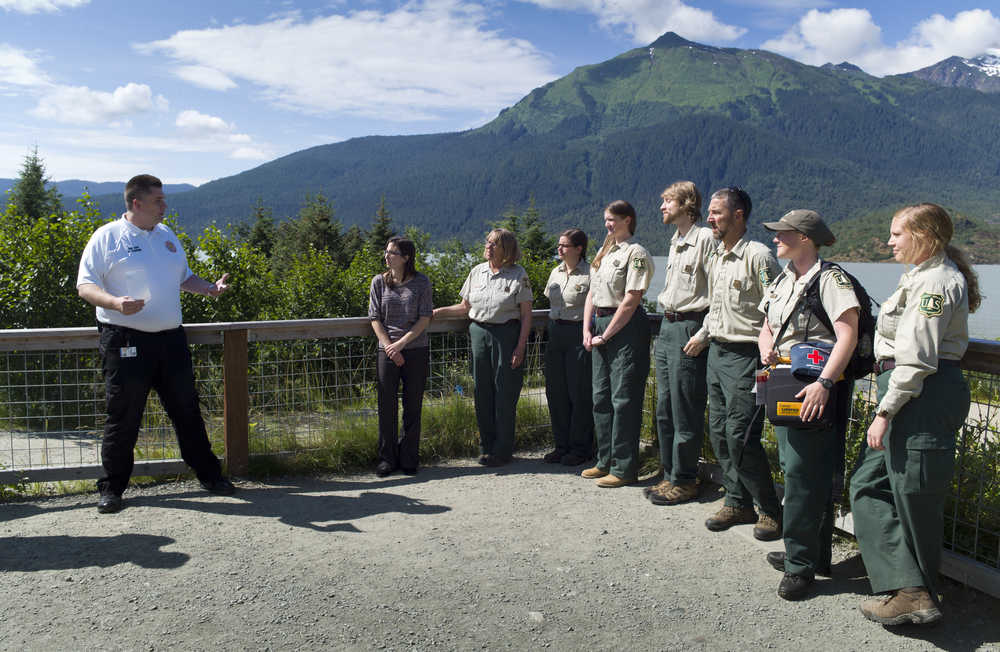There was silence, then the return of a heartbeat, and then a soft voice escaped from the man collapsed on the ground. He was greeted by a cheering crowd celebrating an incredible triumph — he would live.
“The guy’s family was right there, too, hoping for the best,” Mendenhall Glacier Park Ranger Pete Schneider said. “It was a big emotional release.”
Schneider, along with six other park rangers, an out-of-state visitor with EMT training and a 911 dispatcher were all part of the life-saving event that took place July 12 near the Mendenhall Glacier Visitor Center when a 60-year-old man visiting with his wife and daughter collapsed from a heart attack. Capital City Fire/Rescue Fire Chief Richard Etheridge visited the center Tuesday to present everyone involved (minus the person from out of state) with life-saving certificates and Chain of Survival medals in appreciation of their life-saving efforts.
“When I joined the fire department … it was rare to have a CPR save. Some of us were told you’d be lucky to see one in an entire career,” Ethridge told the group in front of a glacier lookout point. “You guys all chose to make a difference that day, and because you made the decision to get involved and get active, this person’s alive and with their family and doing well again.”
It was the first time the team of seven rangers met the 911 dispatcher, Sayde Ridling, who fielded the call and who communicated with the rangers as a CCFR ambulance was en route. It all happened within a matter of minutes, but they all said it felt like much longer as it unfolded.
One ranger, Anne McLean, called on another, Melissa Baechle, to call 911 while EMT-trained ranger Janet Anderson headed to the scene. Ranger Clint Augustson rushed to the area with an automatic external defibrillator (AED) for Anderson to begin shocks and CPR.
“We knew our resources, how to use them and were able to act confidently,” Anderson said.
That confidence came from training only, not experience. All the rangers said they had never experienced anything like that before and were relying on their annual CPR and emergency instructions.
“We’ve had the training, and that’s the first step to being able to respond appropriately,” Schneider said.
Other rangers, Lauren Parker, Stephanie Bogle and Melissa Baechle were also part of the group that helped keep the family calm and controlled the scene while CCFR headed their way. But the team of seven wasn’t just the first response team that day, they were also the entire staff at the park — handling a life-or-death situation while keeping a park with hundreds of visitors running smoothly.
Laurie Craig, the Forest Service Lead Naturalist, said over the course of one year rangers will see over half a million visitors. Many of them are elderly or suffer from mobility issues and, on occasion, health issues arise at the park. Those incidents usually end with a person being carried away in an ambulance and the rangers never find out how things end for their guests.
“We don’t always know the final outcome,” Craig said. “This ceremony gives us a chance to have a little closure on something. This is a true celebration when a life is saved.”
Before the 60-year-old man left the park in the care of CCFR responders, he was breathing and speaking to his loved ones.
“Everyone was concerned and the minute that individual made a noise, just about everybody recognized right away that was a good sign, and they erupted in spontaneous cheer and applause,” Schneider said. “They knew right away … that guy was probably going to make it. That was pretty neat to hear that.”
• Contact reporter Paula Ann Solis at 523-2272 or paula.solis@juneauempire.com.
Related stories:
Alaska House will try to restore PFD, increase deficit
Juneau police await medical reports to learn more about siblings’ deaths
The city just took a small but significant step toward fixing Juneau’s decades-old housing problem

